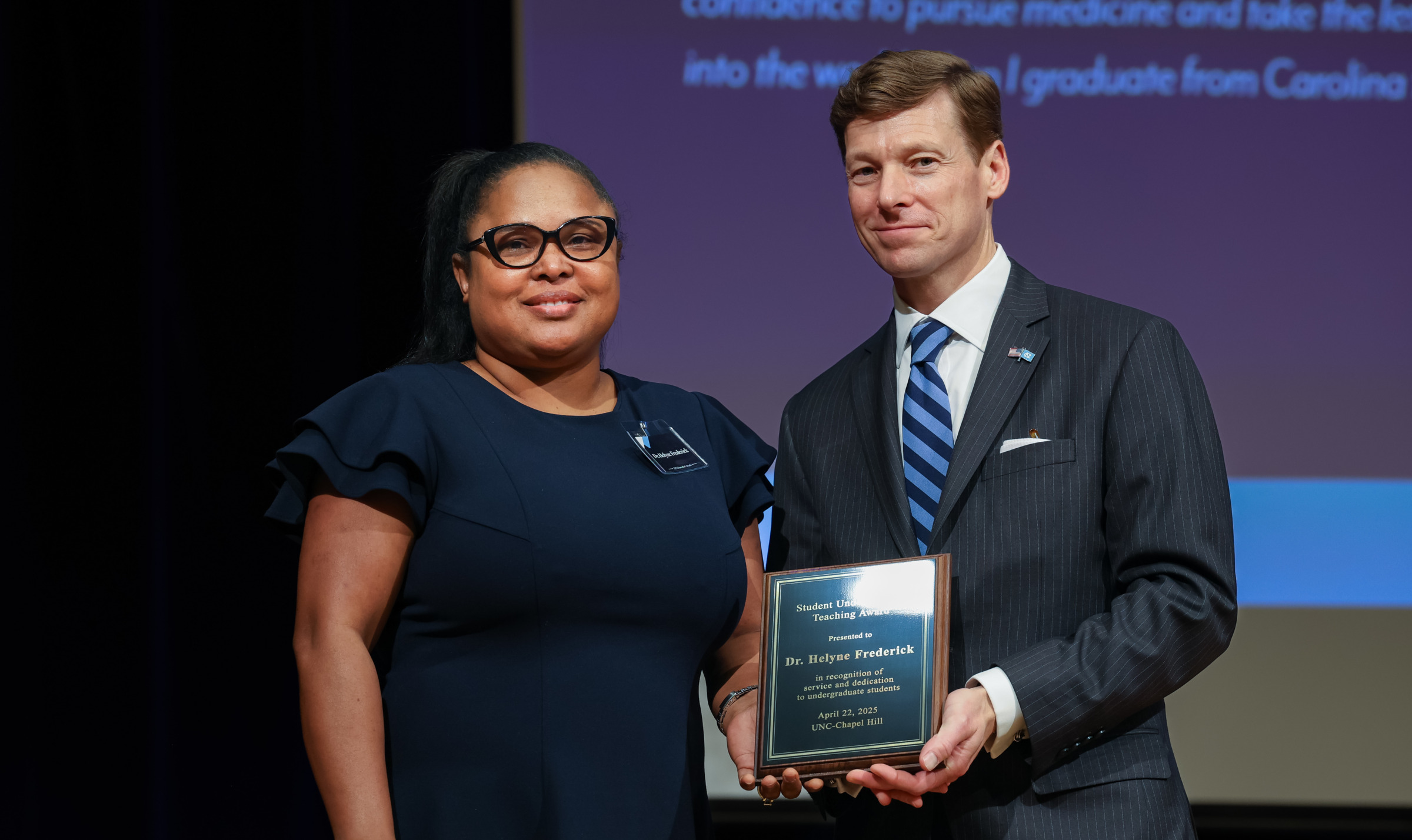During the spring 2025 semester, Helyne Frederick, Ph.D., program director for the UNC School of Education’s Human Development and Family Science (HDSF) program, was selected as a recipient of a 2025 Student Undergraduate Teaching Award.
Frederick and fellow recipients were recognized at the Chancellor’s Awards Ceremony in the Great Hall of the Frank Porter Graham Student Union on April 22.
“Helyne’s dedication to undergraduate student success has had an incredible impact not only within the School but across the broader Carolina campus,” said Jill V. Hamm, Ph.D., dean of the School and William C. Friday Distinguished Professor of Education. “She has fostered important relationships across campus and beyond to create high-impact internship opportunities to connect classroom learning with real-world experiences. Her mentorship and excellence in teaching continue to shape the academic and personal growth of every student she interacts with.”
Established in 1989, the Student Undergraduate Teaching and Staff Awards (SUTASA) recognize outstanding undergraduate instruction from both faculty and teaching assistants. These awards celebrate individuals for their hard work and dedication to enhancing undergraduate education through their time, effort, and impact.
A student-led committee reviewed teaching nominations based on demonstrated and consistent teaching excellence, the ability to positively affect a broad spectrum of students both in and outside the classroom, and the creation of a dynamic and engaging learning environment.
One of Frederick’s nominators wrote: “Dr. Frederick is truly a phenomenal professor and mentor. She has provided me with the support and opportunity that has given me the confidence to pursue medicine and take the lessons I have learned out into the world when I graduate from Carolina this May.”
In a brief Q&A, Frederick shares insights into her teaching and research journey.
As program director of the School’s HDFS program, how do you approach creating a dynamic and accessible learning environment that resonates with students?
I strive to create a learning environment that is student-centered and grounded in real-world relevance through internships and experiential activities. I am proud of the faculty I get to collaborate with in the HDFS program to ensure that we effectively bridge theory and practice. The HDFS faculty come from a variety of backgrounds in education, social, family science, and counseling. We work together to provide both in- and out-of-classroom activities to support students’ interests and career goals, whether it is in education, human services, or health.
Our program has a required internship that I have the pleasure of leading. I work with students and community partners particularly in health and human services to find quality internships and experiential activities each year. I connect students with community organizations and clinics that align with their career and educational goals.
Your work bridges research, teaching, and program leadership. How does your research inform the way you engage students and shape the HDFS program?
My research focuses on topics that are directly relevant to the lived experiences of individuals and families, and that naturally informs both what and how I teach. Whether it’s developmental processes, health disparities, or family systems, I aim to bring research into the classroom in a way that’s digestible and applicable.
At the program level, in addition to promoting education human services professions, I spend significant time helping students who are interested in allied health and health sciences discover pathways to meet the requirements for entry-level positions in the health industry and to relevant graduate programs, including medicine. I teach courses on family health and social determinants of health.
Looking ahead, what are your hopes for the continued success of the HDFS program, and what do you aspire to contribute through your teaching and scholarship?
I envision the HDFS program continuing to grow as a vibrant, interdisciplinary space where students are prepared to lead and serve in a variety of settings. I hope to expand experiential learning opportunities, deepen community partnerships, and foster even stronger connections between research and practice. I aspire to cultivate curiosity, compassion, and a lifelong commitment to learning among our students.
